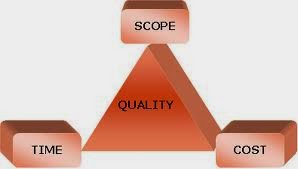In Project Management circles, the Iron
Triangle is seen as both a driving and as a restraining force in
management the successful completion of project on time and within
budget with the anticipated and expected level of quality that was
promised.
However, as anyone knows who has worked
on a project, this is a balancing act at best and at worst, it can
easily become a nightmare.
So, what is it that I am talking about
here?
I am talking about what is referred to
as The Iron Triangle. The Iron Triangle refers to the variables of
Time, Cost, and Quality in equal measures hence the triangle. But,
some project mangers put Time, Cost, and Scope at the points of the
triangle with Quality hovering in the center.
Let's take a look at each one of these
to get a better understanding of what I am trying to get across.
Ok... so, we have this project that
let's say can only last 3 months. We then refer to this 3 month
period as our Time variable. During those 3 months, we have weeks,
days, and hours with which to play and can assume that daily time is
8 hours for 5 days each week, and weekly time is 40 hours and that we
have 4 weeks each moth so we are working with an overall amount of
time of:
- 12 weeks
- 60 days
- 480 hours
If we then look at our Cost variable,
we can derive our total cost from our Scope Statement which calculate
the overall costs and the detailed costs along each step of the way.
These costs would have included:
- salaries & benefits
- labor wages & benefits
- equipment leased
- maintenance
- raw materials
- transportation (gasoline)
- utilities
- phone
- office supplies
Each one of these budget items is
inflated about 10-20% to cover “just in case” expenses not
anticipated. The project, if performed by an outside contractor will
have a profit margin built into the costs as well of 10% or more, all
of which is typically agreed upon before the project even begins.
The quality variable while seemingly
obvious can be very detailed in its requirement and specifications if
dealing with a project of creating new computer software or a new
competitive product that must perform a certain way under certain
situations and conditions.
If the output of the project is a
restaurant meal for a customer, then if poses different types of
quality restraints than if the output of the project was an
automotive vehicle or a military weapon or even a bridge connection 2
land masses with a quarter mile of water in between them.
However, if the output of the project
is a backyard deck or a utility building then obviously the quality
requirements are going to be or could be a little more relaxed
As I mentioned earlier, some project
managers put Scope at one of the corners instead of Quality. Project
Scope can be defined as how the project is going to get from point A
to point B in a certain amount of time (in this case 12 weeks).
Now... let's play around with our Iron
Triangle.
Suppose half way through the project,
the owner of the project comes up to you and indicates that there
needs to be 2 more stops between point A and point B.
What would you do?
Simple... everything immediately gets
renegotiated... and, a clause to this effect has been included in
the original project contract.
If 2 more stops are being added, then
that could impact our Time variable, our Cost variable, as well as
our Quality variable.
Is the project owner willing to pay
more money or accept more time or a reduction in quality? If the
answer is no to all of these, the project continues as planned...
but, if the project owner is willing to accept some slight changes,
then a new scope arrangement has to be made.
This may not seem like a big problem
but if the equipment is leased, the project may not be able to hold
on to it past the deadline for its return. The labor might be
promised for some other project that must start on time as well; and,
if that is the case then overtime will be required. And, the project
may have completed so many crucial milestones (measures of
completion) that its course can no longer be altered.
A change in each one of these variables
will cause increases or decreases in the other two and it is up to
the project manager or leader to be able to see and identify all
theses complications or be able to absorb the costs if he doesn't.
A project manager's reputation can be
made or broken by The Iron Triangle.


.jpg)